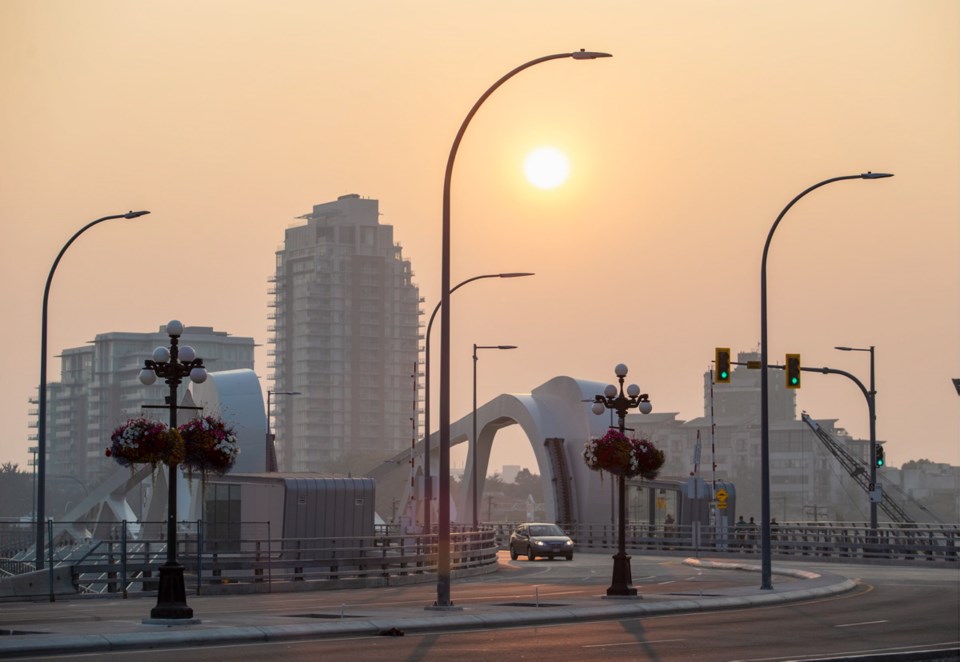Concerns about ongoing smoky conditions meant activities were moved indoors Tuesday for the more than 200 children in summer programs at West Shore Parks and Recreation.
Smoke from the more than 500 wildfires across B.C. is expected to keep the south Island and other areas gloomy for at least a few more days.
Acting recreation director Geoff Welham said the staff was keeping a close eye on weather advisories.
“It’s something that we’ve been paying attention to this week, and we reached out to our parents and our families Monday afternoon and informed them camps that are traditionally outdoors all day will be coming indoors,” he said.
At Westhills Stadium, some players on the Canadian women’s rugby sevens team wore surgical masks during practice as a precaution against the effects of smoke and particulates.
“It doesn’t take long to feel it,” said coach John Tait.
“Definitely half an hour or less. Your throat is drier than normal and the players can feel themselves struggling for oxygen. It’s a bit of a challenge.”
Dr. Dee Hoyano, an Island Health medical health officer, said masks and bandanas can help, but won’t keep everything away.
She said a respirator could do the trick “but, practically speaking, it’s very uncomfortable.”
People should consider taking it easy while these conditions persist, Hoyano said.
“For the general population, we’re not saying you shouldn’t do any activity,” she said. “A lot of people just naturally are going to feel like their capacity is limited.
“Definitely listen to your body and slow down.”
An ongoing smoky skies bulletin for Vancouver Island warns that conditions can change significantly hour to hour.
The weather isn’t expected to change enough to help clear the smoke for another few days, said Environment Canada meteorologist Lisa Erven.
“It’s very much based on wind direction,” she said.
Easterly and northeasterly winds have brought wildfire smoke from the Interior to the coast, while a ridge of high pressure in the area is trapping the smoke, Erven said. “You’ve got this cap keeping the smoke close to the Earth’s surface.”
By tonight, more of a westerly wind is expected.
“We should see a reversal in wind direction and some cleaner ocean air pushing onto coastal B.C.,” Erven said. “Along the coast we should be looking at improved air quality as we get into late this week.”
Sixty-five fires are burning north of Campbell River. Up to six others around the Island are considered under control or are in the mop-up stage, including the Nanaimo Lakes fire.
In Zeballos, an ongoing fire on a slope next to the village was met with some water drops from a helicopter Tuesday. Poor visibility kept the helicopter grounded in the morning.
Occupants of six homes have so far had evacuation orders, while others have left the area to avoid the situation, said Coastal Fire Centre information officer Lynne Wheeler.
“There is no immediate risk to structures from the fire itself.”
Anecdotal reports that fewer birds are singing due to the haze are off the mark.
“We’re out of the birdsong period right now,” said Victoria ornithologist Ann Nightingale. “We’re into migration [and] we tend to get less birdsong during migration.
“One area where the smoke does potentially have some effect is that migrating birds often use stars to migrate, and so we’re getting the same effect potentially with the smoke as we would with a heavy fog.”
In Langford, councillors have agreed to write a letter asking that the provincial and federal governments come up with a long-term plan to dedicate more resources to fighting wildfires.
“We appreciated that the premier has declared a state of emergency. However, we’re concerned about the level of resources that are being provided to actually fight the fires and to look at the long-term plan,” said Langford Coun. Lillian Szpak, who introduced the motion.
“Are we looking at a new normal here? If so, we need to be prepared and municipalities cannot shoulder that.”
Langford council felt compelled to speak up, Szpak said, because the wildfire smoke is “severely impacting our communities.”
“It’s affecting tourism, the economy, people’s health and lifestyle.”
— With files from Cleve Dheensaw and Katie DeRosa



